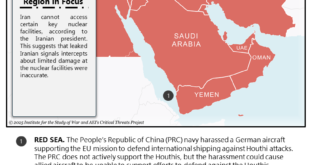BERLIN (Reuters) — Iran has failed to meet a UN Security Council demand that it suspend uranium enrichment, six world powers agreed on Thursday, but there was growing opposition to US calls for sanctions.
Senior officials from Germany, France, Britain, the United States, Russia and China met in Berlin to work out a strategy on Iran, but while they agreed Tehran had not halted enrichment, there was little sign the powers agreed on what to do about it.
“There was a common analysis on where we were. The [IAEA] report made clear that Iran has not met the requirements of the Security Council and the IAEA,” said a senior European Union diplomat, speaking on condition of anonymity.
The International Atomic Energy Agency (IAEA) said Iran was still producing uranium fuel up to an Aug. 31 deadline set by Security Council Resolution 1696.
“We had a first discussion of next steps in the Security Council following the lines of Resolution 1696,” he said.
The resolution said sanctions could follow if Iran failed to meet the deadline, but the diplomat declined to say whether there was any consensus on what next steps should be taken and when. Talks between the powers will continue next week, he said.
The diplomat said all countries hoped Iran would suspend enrichment and begin negotiations on a package of incentives the six powers offered to Iran in June.
“The door remains open to Iran,” he said.
Asked whether there was agreement between the six that it was now time to impose sanctions on Iran, he referred repeatedly to Resolution 1696, a motion passed on July 31 which raised the possibility that Tehran could face UN sanctions.
“There’s a commitment to the implementation of Resolution 1696,” he said, adding that the six were unanimous on this point. But he declined to say what the six disagreed on. Tehran rejects Western accusations that it is trying to develop nuclear arms. Iran, the world’s fourth biggest oil exporter, says it only wants the fuel to generate electricity.
Â
US faces opposition to sanctions
Â
Despite the diplomat’s presentation of a unified front after the nearly four-hour meeting in Berlin, the United States faces growing opposition to its bid to persuade other powers to impose sanctions on Iran over its nuclear programme, with China urging dialogue and France signalling flexibility on the suspension.
While China and Russia implicitly backed the idea of sanctions by voting for Resolution 1696, they both remain reluctant to penalise the Islamic republic and question Western accusations that Iran poses a nuclear threat.
Before the meeting China stressed the diplomatic options.
“China advocates this issue be resolved through negotiation and dialogue in a peaceful way and this position remains unchanged,” said foreign ministry spokesman Qin Gang.
France also indicated it was not yet time for sanctions by suggesting world powers may be flexible over a previous demand that Iran suspend its enrichment work before starting talks.
Foreign Minister Philippe Douste-Blazy said the timing of any suspension was crucial and that it could be discussed.
“It’s a major question… which will perhaps emerge as important in the weeks ahead,” he told reporters.
Some diplomats expressed doubt Washington would succeed due to opposition to sanctions in EU capitals, Moscow and Beijing.
Iran insists it has a right to peaceful nuclear technology.
“The Americans must realise the language of threats does not work. A nuclear state that used nuclear weapons in Hiroshima and Nagasaki cannot demand other countries not use nuclear power for peaceful purposes,” Iranian Foreign Minister Manouchehr Mottaki told a news conference in the Belarusian capital Minsk.
 Eurasia Press & News
Eurasia Press & News


